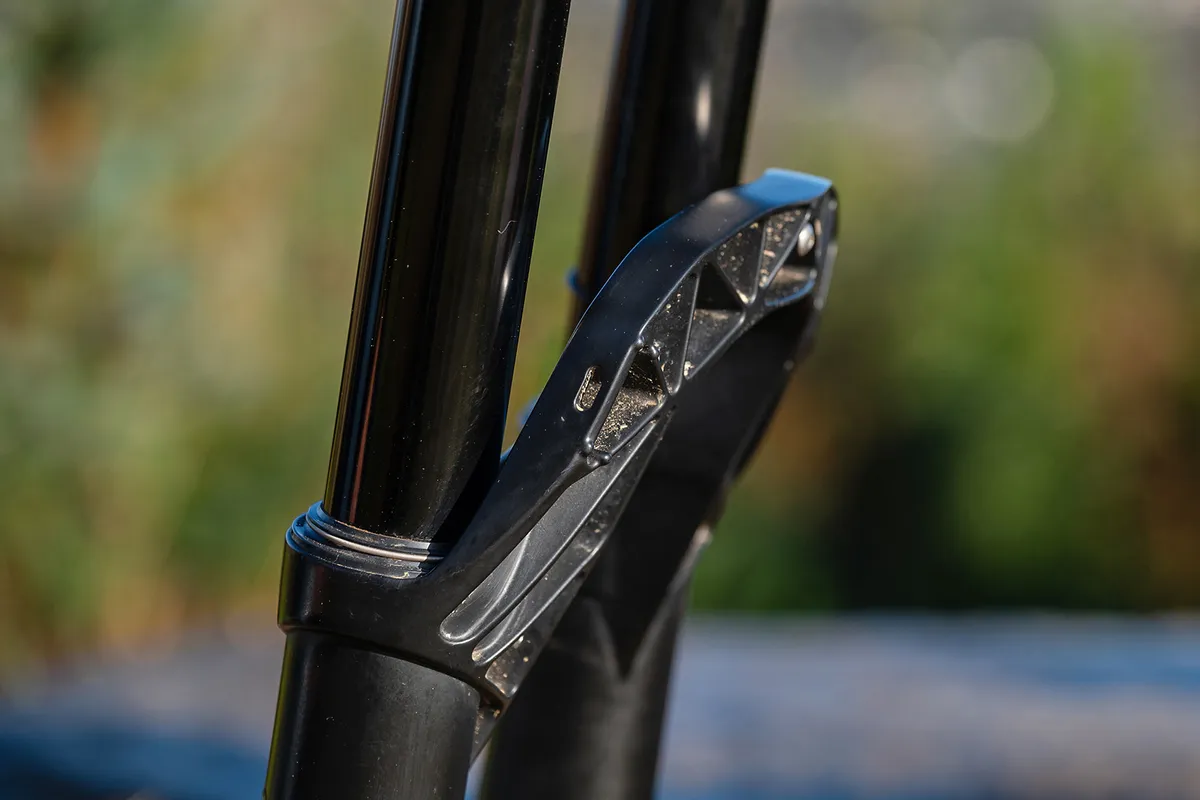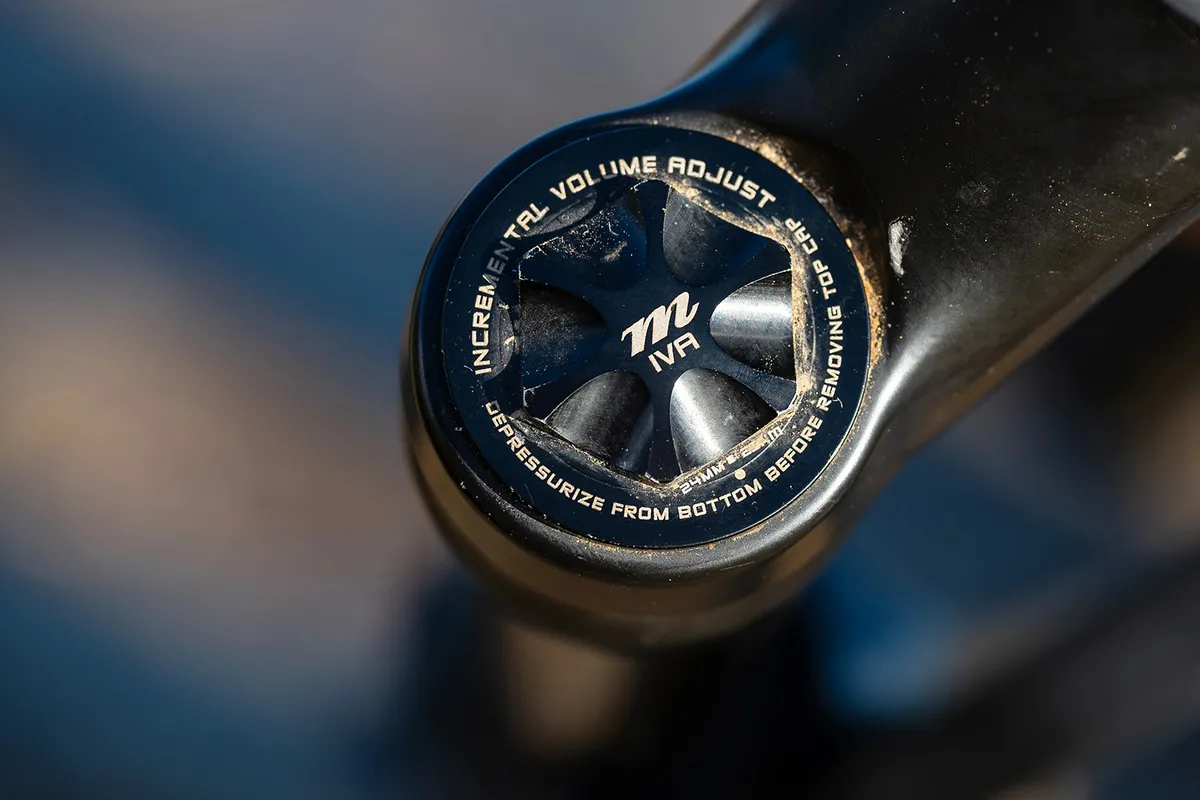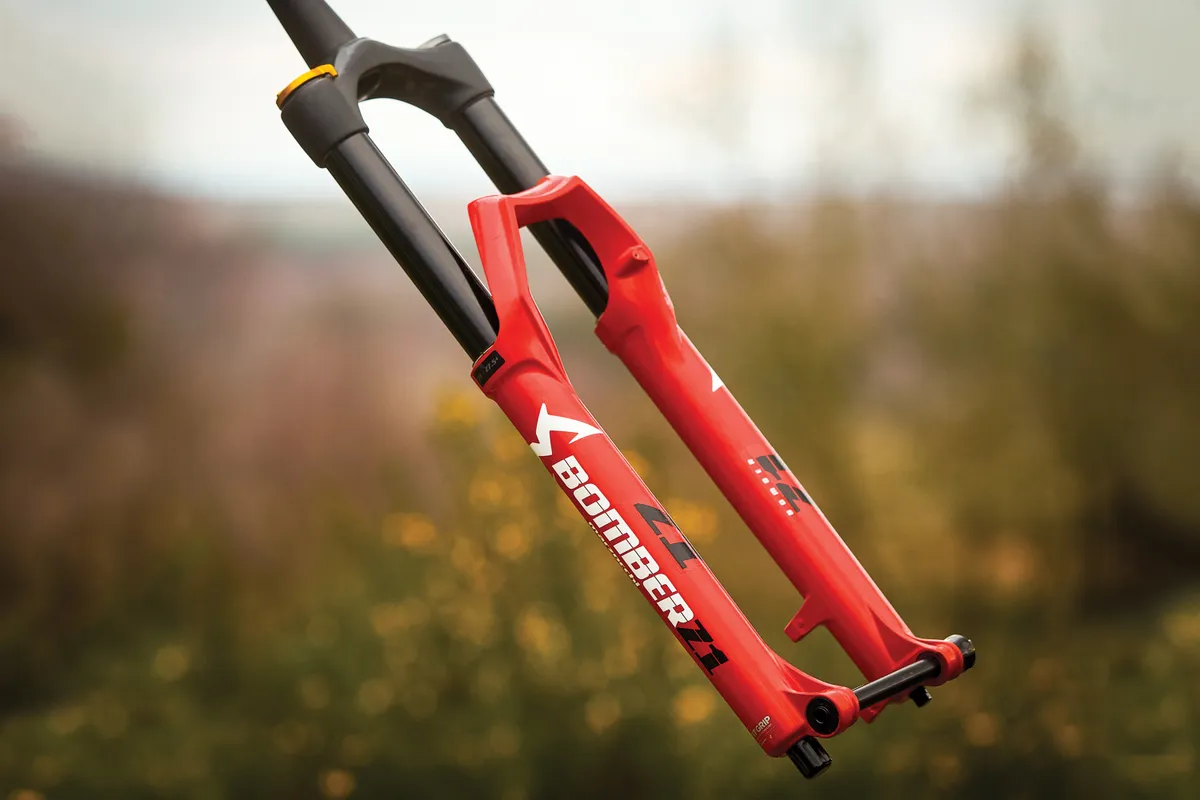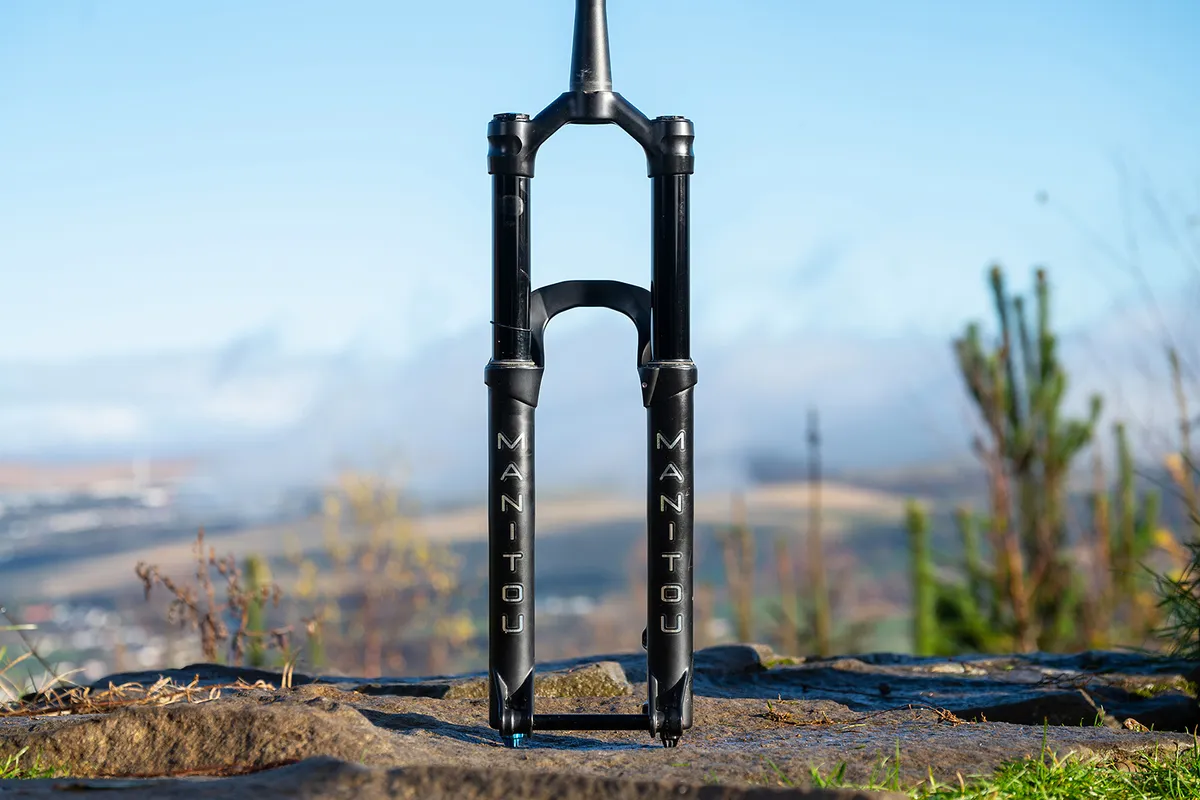Manitou's Mezzer Expert is the cheaper cousin of the Mezzer Pro, costing a very respectable £700/$849.99. That's considerably cheaper than a Marzocchi Bomber Z1 or a RockShox ZEB Select, and it outperforms both of those forks in some areas.
The Mezzer Expert wouldn't be a Manitou fork if it didn't do things a little differently – it's built around unique 37mm stanchions and a reverse-arch design that claims to save weight while maintaining stiffness.
It features externally adjustable low-speed compression and rebound damping with a lockout. The air spring also has in-built volume adjustment.
Manitou Mezzer Expert specification and details

The budget suspension fork uses the same chassis as the Pro model, featuring Manitou's signature reverse-arch lowers.
Manitou claims running the arch behind the stanchions enables it to use less material, while keeping the forks as stiff as a traditional design.
The arch also acts as a barrier, protecting the seals better from mud thrown up by the front wheel.
The Mezzer Expert is available for 27.5in or 29in wheel sizes. Travel is internally adjustable in 10mm increments from 140mm to 180mm.
The fork has a 180mm brake mount and can take a maximum rotor size of 223mm.
There are bleeder valves at the back of the arch to release air pressure build-up in the lower legs. However, you must use a 2.5mm Allen key to undo them rather than press a button like that seen on Fox or RockShox forks.
The Mezzer uses a Boost 110x15mm bolt-thru axle and includes a bolt-on – albeit flimsy – mudguard.

I tested the 29er fork in the 170mm setting. This has a 44mm offset.
Considering its enduro ambitions, the Manitou Mezzer Expert is very light at 2.09kg. That's 370 grams lighter than a Fox 38 Performance Elite.
Air spring tech
The air spring uses self-equalising positive and negative chambers and is dubbed Expert Air by Manitou. This is based on the Dorado Air system used in Manitou's downhill forks.
It also uses Manitou's IVA (Incremental Volume Adjuster) system. This enables you to modify the positive air chamber volume by rearranging self-contained spacers. As a result, you never have to attach or remove a volume spacer to achieve your preferred progression.
Another quirk of the Manitou Mezzer Expert is you fill the air chambers from the bottom of the fork.
An adjustable damper
Manitou uses its VTT-6P damper. This open bath cartridge has a six-position external compression adjuster that simultaneously adjusts the high-speed and low-speed damping.
There are two shim stacks – one fixed and a secondary one preloaded by the external adjuster. This preload increases the damping force.
The cartridge also has low-speed rebound damping. This is adjusted at the bottom of the fork.
The damper uses two separate pistons. The compression piston is fixed, and the rebound piston slides through the cartridge. This means oil is always pushed through the pistons, not pulled, reducing cavitation and aeration in the oil. This should provide more consistent performance.
Manitou Mezzer Expert performance

Manitou Mezzer Expert setup
I set the forks to 50psi, which is a little over what Manitou recommends for my 75kg weight.
I ran the compression open, which was my personal preference. That said, the six clicks of compression damping will be usable for lighter and heavier riders, with each click having a noticeable effect.
I settled on seven clicks of rebound damping from closed, out of a possible 10.
I was happy with the progression of the forks, so I left the IVA in position two out of five.
The spring volume is small, which means a full stroke of the shock pump makes a big difference to the pressure.
With that in mind, I found it much easier to set the pressure with a digital shock pump – fine-tuning with a digital pump is much easier than with an analogue one.
Manitou Mezzer Expert ride impressions
From the get-go, small bump sensitivity was excellent. When cruising along chattery trails, the Mezzer's low breakaway force meant it sat comfortably in its sag range and soaked up small bumps nicely.
This helped reduce buzz through the handlebars and maintained tyre contact.
Push the fork a little harder, and the Manitou is incredibly smooth as it moves into its mid-stroke. There's minimal friction in the fork, which enables the Mezzer Expert to use its travel well when the trail comes at you thick and fast.
The mid-stroke of the travel feels close to that of the RockShox ZEB Ultimate, which delivers plenty of comfort and traction over mid-sized hits from rocks and roots.
Mid-stroke support is middling, but its ability to use its travel and recover from repeated hits quickly delivers excellent control.
Across different fork brands, mid-stroke support varies over a spectrum. Forks such as the EXT ERA V2 have plenty, while the RockShox ZEB Ultimate RC2 Charger2.1 has less. The Mezzer Expert sits in the middle, resulting in a controlled feel when faced with successive hits.
The fork swallows trail features and does an excellent job of isolating these impacts from reaching the rider – pummel through a rock garden and there's a calmness to the front end that helps boost confidence.
Progression to the end-stroke builds smoothly, and there isn't a sharp spike in ramp-up. The IVA is useful and easy to change, especially because you don't need to remember or find parts.
Due to the Mezzer Expert’s mid-stroke support, ability to recover from hard hits and smooth progression, I could reach full travel with my settings, but I never found myself constantly deep in the fork's stroke. I was never hesitant about landing drops or plowing into deep compressions – the Mezzer always had enough support, yet didn't feel harsh.
The rebound damping range is good and the fork can recover fast enough, even at low air spring pressures. I like to run fast rebound and there is still room to speed it up, which would help lighter riders with lower pressures.
This meant the fork stayed predictable and comfortable through repeated hits, such as braking bumps and rock gardens, where it didn't become packed down.
The Mezzer Expert doesn't have the most lively ride feel and is happiest keeping your wheel glued to the floor, but this helps provide tons of grip and confidence in the corners, through roots, rocks and rough sections of trail.
While the reverse arch might divide opinions with its looks, if you believe Manitou's marketing, it may even offer some benefits.
On the trail, the 37mm-diameter stanchion fork was plenty stiff enough. I never noticed it flexing under light load turns or sharp direction changes – or binding significantly under heavy compressions. I'm not the heaviest rider, but it felt stiff enough on the trail.
Accuracy through technical sections was good, and I didn't notice the fork wanting to ping me off my line or make the front wheel skip about.
How does the Manitou Mezzer Expert compare to the Marzocchi Bomber Z1?

The Marzocchi Bomber Z1 is a natural competitor to the Manitou because it shares the same external adjustments and a similar price point. It features a stocky 36mm chassis, and Fox's dependable GRIP damper and EVOL air spring internals.
The Manitou wins out with its small bump sensitivity. However, the Bomber has a slightly more supportive mid-stroke, which some riders might enjoy.
You could add some compression damping to the Mezzer, but you would lose sensitivity. On the other hand, others prefer the comfort of the Manitou. Progression is good for both forks and can be fine-tuned.
Nevertheless, the Manitou wins for price and weight. It would be my pick of the two if you're looking for a moderately priced burly enduro fork.
Manitou Mezzer Expert bottom line

If you're looking to upgrade your suspension but need to stick to a budget, the Manitou Mezzer Expert comes highly recommended.
The small bump sensitivity is impressive with a decent, comfortable yet supportive mid-stroke support, and the fork progression can be fine-tuned. The compression range works well, and the rebound speeds are fast enough that the fork can handle repeated hits.
This is wrapped up in a stiff but usable chassis that provides accurate handling. I don't think there's a better fork out there for the price, and it often performs better than some more expensive rivals. However, it still isn’t the best fork available, which I believe is the RockShox ZEB Ultimate RC2 Charger 2.1.
Overall, the Mezzer Pro's performance-to-price ratio is brilliant, especially when you factor in that this was the cheapest fork on test.
How we tested
The best mountain bike suspension forks are a pricey upgrade, but are one of the most important parts of a bike. They influence performance greatly, contributing to handling, comfort and control.
In addition, forks are one of the first big upgrades riders buy, so picking the right one is essential.
We tested seven forks that cover a wide range of price points.
The forks were put through their paces on both the black and rough red trails at BikePark Wales, repeating laps to make testing as consistent as possible.
Forks on test
- Fox 38 Performance Elite
- DVO ONYX SC D1
- EXT ERA V2
- RockShox ZEB Select review
- Cane Creek Helm MkII
- Manitou Mezza Expert
- Formula Selva R
Product
| Brand | manitou |
| Price | 700.00 GBP,850.00 USD |
| Weight | 2090.0000, GRAM () - axle included |
Features
| br_spring | air |
| br_lockout | yes |
| br_wheelSize | 29in_700c |
| br_offset | 44.0000 |
| br_offset | MILLIMETER |
| br_travel | 170.0000 |
| br_travel | MILLIMETER |
| br_stanchionDiameter | 37.0000 |
| br_stanchionDiameter | MILLIMETER |
| Features | Spring: Air – self-equalising positive and negative chambers Damping: External compression low-speed rebound adjustment Axle: 110x15 quick-release Brake mount: 180mm Wheel size: 29in, 27.5in Offset: 37mm / 44mm (27.5in), 44mm / 51mm (29in) Travel: 140mm – 180mm |
